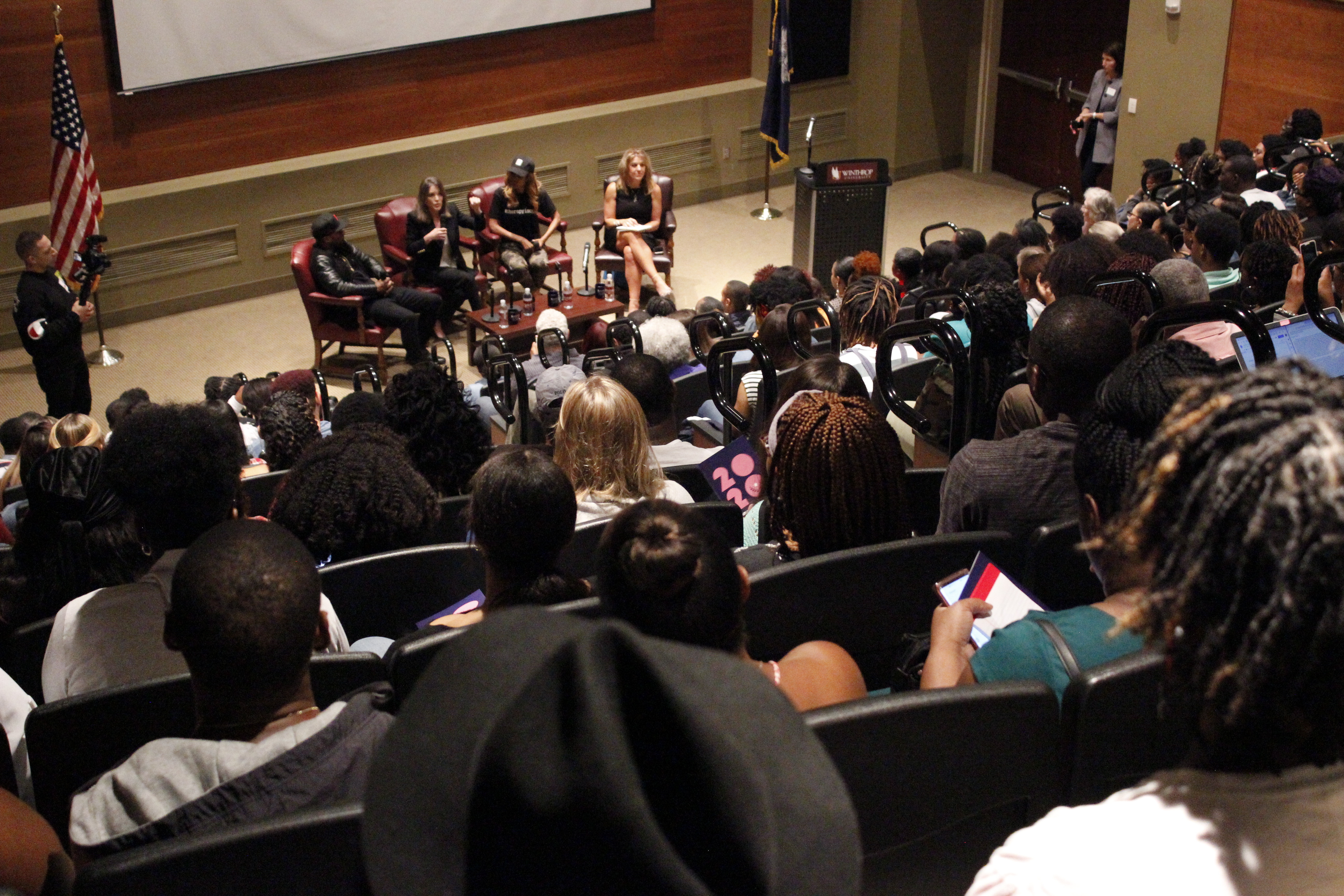Winthrop hosted another presidential hopeful who came to campus with a different approach than most on the campaign trail: a discussion with a former member of Destiny’s Child and a famous radio personality.
Author and Democratic presidential candidate Marianne Williamson stopped by Dina’s Place alongside Michelle Williams and Chalamagne Tha God on Oct. 28. to not only talk about the election but the importance of mental health.
Williamson is not the first candidate that has came to Winthrop this semester. Sen. Bernie Sanders of Vermont came in September.
“Winthrop is a public institution dedicated to serving the state of South Carolina and to promoting the free exchange of ideas and informed citizenship. Thus, the university welcomes political candidates, elected officials and guest speakers from all partisan and ideological perspectives to visit campus,” News and Media Services Manager Judy Longshaw said.
Winthrop students and supporters from surrounding areas came to hear the conversation. Joey Smith, a junior at Winthrop, explained his thoughts about Williamson and his interest in hearing about her policies.
“I would like to know more about her department of peace and youth,” Smith said. “I like her as a candidate and want to know more about her stance on mental health and how that will translate to her potential presidency.”
Smith said there is a possibility that if Williamson were to be a choice in the primary he would vote for her.
“I suffer from the common American problem of thinking too much of what everyone else is thinking, so we’ll see. It is a possibility,” Smith said. He added that other candidates definitely cannot “talk about the same things Williamson can talk about.”.
Ayana Crawford, a Winthrop alum who holds a degree in psychology, said that she learned about the event through Williamson’s social media. Crawford is not a current supporter of any of the speakers, but that “might change.”
“Mental health is very important to me,” Crawford said. “Unfortunately I feel as though candidates are not talking about it enough or providing practical solutions to the nation’s growing mental health problems”.
Michelle Williams, formerly of Destiny’s Child, talked about her past and present struggles with depression. She talked about how her mental health was affected during her time with the group and recalled feeling that Destiny’s Child had “a lot of great things going on” but that she felt worn out and emotional and couldn’t fully enjoy their success.
Williams shared how she developed a lot of negative coping mechanisms into her 30s to deal with depression. Williams explained how it is still something she deals with but that “Jesus and therapy” have helped her more than she can explain. Williams talked about the stigma within her own church community that made her feel like being depressed was a lack of faith in God. Williams doesn’t agree with this mindset and wants others to be more accepting of those dealing with these matters.
Lenard McKelvey — better known as Charlamagne Tha God — is the co-host of the popular morning radio show The Breakfast Club. McKelvey recently published a book titled “Shook One: Anxiety Playing Tricks on Me” where he opened about his about his past and present struggles with anxiety. McKelvey recalled how after reading his book his father opened up to him about his struggles with mental health and how he tried to take his own life years ago.
McKelvey talked about his personal choice to want to be a better version of himself helped him get on a path to be more accepting of his mental health experience. “I appreciated Charlemagne stating that ‘it’s okay not being okay, but it’s not okay staying not okay.’ I think people needed to hear that and know that these resources for them to use and not choose to suffer,” Crawford said.
Williamson talked about how our society is “toxic” with cell phones always being on. Williamson remembered a time she woke up in the middle of the night to check her phone and how that experience was a wake-up call to spend more time away from screens. She added that our society plays a big role in our mental health as a country.
“Ninety-three million Americans live near poverty, most of which don’t know what they will do if they get sick or if their children get sick,” Williamson said. She also made reference to the initiative to give American students more access to internet but how in Europe they are taking the internet out of the schools.
Williams talked about the problem of comparing ourselves to each other on social media and McKelvey explained how social media is essentially a highlight reel to which we try to give our lives unrealistic expectations. Williamson went on to add how societal expectations also add to this problem and how an important part of getting back on the right track is setting aside five minutes per day for self-care.
“We feel we have to look a certain way to be attractive, we have to do a certain kind of thing to be successful, we have to make a certain amount of money for our lives to have value, of course we feel depressed,” Williamson said.




